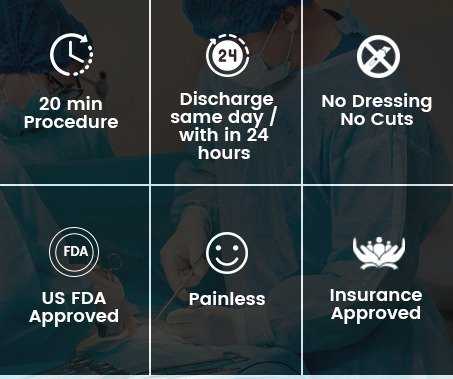Well Experienced Doctor
Most Advance Treatment
Patient Friendly Environment
TREATMENT FOR MALE INFERTILITY
Minimal Pain
No Stitch
No Scar
30 Min Procedure

NO PAIN
NO CUT

ANAESTHESIA

ACCEPT AYUSHMAN CARD

24 HOUR OBSERVATION
TREATMENT FOR MALE INFERTILITY
Minimal Pain
No Stitch
No Scar
30 Min Procedure

NO PAIN NO CUT

ANAESTHESIA

ACCEPT AYUSHMAN CARD

24 HOUR OBSERVATION

What is Male Infertility?
Male infertility is the inability of a man to impregnate his fertile partner, affecting around 7% of men. Causes include poor semen quality, low sperm production, and erectile dysfunction. Seeking medical attention is crucial, and effective treatments are available.
How common is male infertility?
Infertility is a serious or common health issue worldwide, affected couples worldwide is approximately 8%–10%. Worldwide, 60–80 million couples suffer from infertility every year, probably between 15 and 20 million (25%) are in India alone.
Is it easy to conceive?
No, Conception is a multi-step process that depends on multiple factors:
- The production of healthy eggs by the female and healthy sperm by the male.
- Healthy fallopian tubes ( unblocked) are necessary for the sperm to reach the egg.
- Healthy sperm’s to fertilize the egg when they meet.
- The healthy fertilized egg (embryo) has, the ability to become implanted in the female’s uterus.
- Good embryo quality.
Finally, for the pregnancy to continue to full term, depends on many factors like healthy embryo formation and the female’s hormonal environment. Infertility can be caused by impairment in any of these factor involved.
Which males are more likely to have infertility?
Some health-related conditions in the male that might lead to male infertility in some cases are:
- You are overweight or obese.
- You’re age 40 or older.
- You’ve been exposed to radiation.
- You’ve heavy metal toxins like lead, cadmium, mercury, and pesticides
- You use tobacco, alcohol, and illegal substances like marijuana.
- High temperature around your testes, like people working in high temperature( furnace).
- History of undescended testicle(s).
- History of varicoceles, widened veins in your scrotum.
- You’ve been exposed to testosterone in the form of injections, topical gels, and implants
What causes male infertility?
Many biological and environmental factors can impact men infertility reasons. most common cause of male infertility include:
- Azoospermia: Inability to produce sperm.
- Malformed sperm: Abnormally formed sperm that are unable to fertilize the egg.
- Some medical conditions: Diabetes, Genetic and autoimmune disorders, and some infections.
- Oligospermia: Low or poor-quality sperm production
- Genetic diseases: Klinefeflter’s syndrome, Turner syndrome, myotonic dystrophy, microdeletion, and more.
- Some medications and supplements.
- Variococles: Dilated veins around the testis, cause them to overheat, which can affect the physiology, morphology, and count of your sperm.
- Cancer treatments:Surgical removal of testis; Chemotherapy and radiation therapy.
- Unhealthy habits:Like Alcohol use, smoking and Substance use
- Trauma to your testes.
- Hormonal disorders: Fertility can be affected by hormonal disturbance or problem in hypothalamus or pituitary glands.
What are the symptoms of male infertility?
The infertility itself is the symptom. However, it’s much more difficult to describe the negative psychological and emotional symptoms infertility has on a couple who wants to have children. Many times, conceiving a child becomes the total focus of their lives. Feelings of depression, loss, grief, inadequacy and failure are common in males as well as females seeking pregnancy.
Individuals or couples experiencing any of these feelings may want to seek professional help from healthcare providers like a therapist or psychiatrist experienced in dealing with infertility issues. Such providers can help you deal realistically with the situation and provide support even while you are going through treatment.
How is male infertility evaluated and diagnosed?
Diagnosis starts with a complete physical examination to determine the general state of the patient’s health and identification of any physical problems that may be affecting fertility. If the physical examination and history don’t indicate any reason for the inability to conceive, the next step may be to conduct testing to identify the cause of infertility.
What tests are done?
Semen analysis for infertility test to determines the following:
- Sperm volume: Amount of sperm per ejaculate.
- pH: Level of acidity or basicity.
- Sperm concentration: Number of sperm per millimeter of semen.
- Total sperm count: Number of sperm in a per ejaculate.
- Velocity: How fast your sperm travels.
- Linearity: How straight of sperm moves.
- Morphology: Size and shape of sperm.
- Color.
- Viscosity: How fast your semen liquefies.
Next, the concerned doctor may do a detailed sperm analysis, which examines sperms about:
Next, the concerned doctor may do a detailed sperm analysis, which examines sperms about:
- Viability, or ability to survive.
- Morphology, or quality and shape.
- Motility is a sperm’s ability to move and fertilize an egg.
Other possible tests include:
- Leukocytospermia quantitation/Endtz test.
- Kruger’s strict morphology classification.
- W.H.O. morphology for sperm assessment.
- Special staining for the azoospermic specimen.
- Semen biochemistry fructose test.
- Sperm antibody tests (direct and indirect comb test).
- Reactive oxygen species.
- Sperm DNA assessment.
How is male infertility treated?
Depending on the cause of male infertility, there are a number of best treatment for male infertility available in this modern era of technology, Some of them are:
Medications:
- Hormone therapy to increase the number of sperm.
Lifestyle changes
- Stop using marijuana.
- Stop smoking.
- Stop drinking.
- Stop any recreational drug use.
- Reduce weight, in range of recommended BMI.
Surgeries:
- Vasectomy reversal: The surgeon may reconnect the vas with the use of a microscope..
- Sperm Retrieval: In some severe cases, a biopsy of the testicle is done to retrieve sperm.
Just because you have infertility issues, that doesn’t mean you’ll never be able to have your child. There are treatment options that can increase the chance of conception if you and your partner work together with your healthcare provider.
Prevention
Can male infertility be prevented? How can I reduce my risk of infertility?
If your infertility is affected by lifestyle choices such as smoking and working around certain chemicals, you might be able to reduce your risk. Talk to your healthcare provider about other risk factors and what you can do about them.
If you’re going to go through cancer treatment, talk to your healthcare provider about sperm banking.
Outlook / Prognosis
What’s the outlook for males with infertility?
Just because you have infertility issues, that doesn’t mean you’ll never be able to have your child. There are treatment options. If you work together with your partner and an urologist, you can increase your chances of conception.
Can male infertility go away on its own?
male infertility requires treatment in most cases.
FAQs Around Male Infertility Treatment
The incapacity to conceive as a result of problems with the male reproductive system, such as low sperm count, poor motility, and anatomical abnormalities, is known as male infertility.
To diagnose infertility, a medical history, physical examination, and semen analysis are performed.
Yes, sperm production and quality can be adversely affected by substances found in the environment, alcohol, drugs, smoking, obesity, and other health issues.
Alterations in lifestyle, medicine, surgery, sperm retrieval techniques, and assisted reproductive technologies (ART) are available forms of treatment.
Success rates can be reviewed with a reproductive professional; effectiveness varies depending on the cause.





